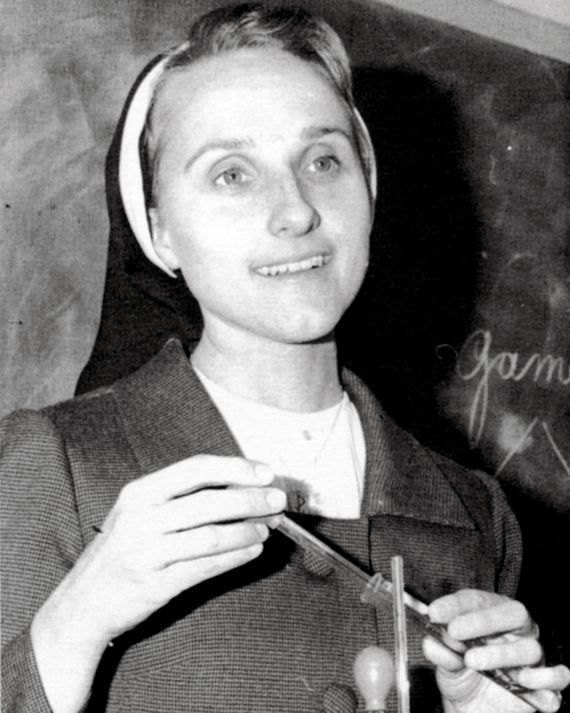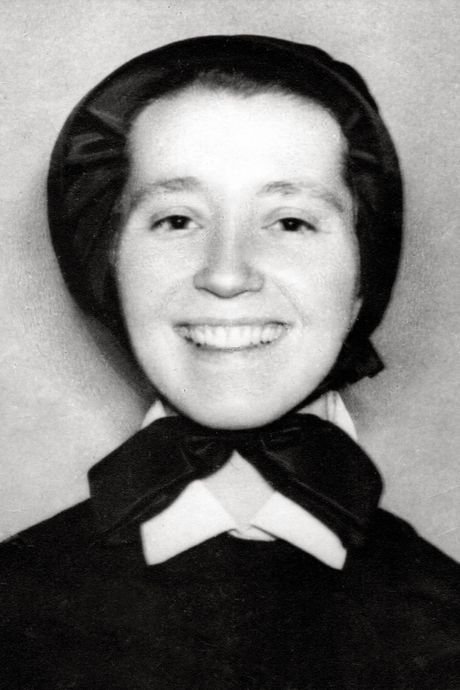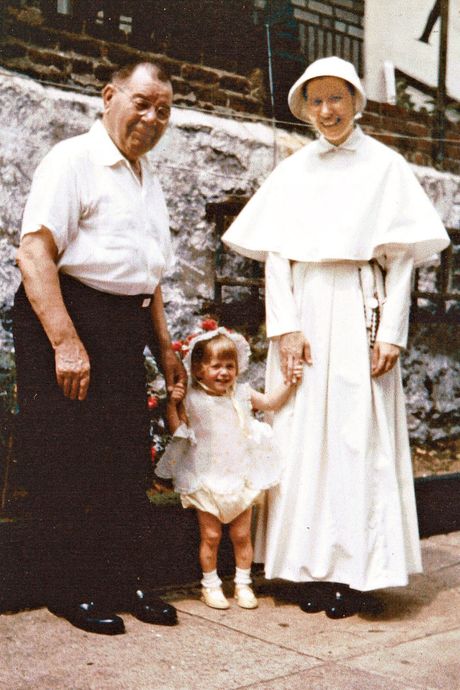
The sisters of Mount Saint Vincent Convent, in the Bronx, are not inclined toward self-pity. They are much more comfortable looking outward. Many of them entered the convent as young women in the 1950s, saying no to marriage and children at a time when those things were assumed to be a woman’s calling. Instead, they took vows of poverty, chastity, and obedience and dedicated their lives to caring for their communities.
Sister Joan Burbage: My days are actually exactly the same as before the pandemic. I’m an old lady! I’ve been retired for a number of years.
Sister Barbara Srozenski: We have around 50 sisters here. Normally, we share a great deal of time with each other, at meals, at talks and discussion groups. That’s a real loss right now. So a great deal of time is spent in prayer. The thing is, when we do have this time to reflect, to pray, you become terribly aware of the situation in the world today.
Sister Joan: We used to have daily Mass here. There’s a residence for priests five minutes away, and a priest would come over.
Sister Margaret Donegan: But the priests are also quarantined. So we have to watch it on TV.
Sister Rita Nowatzki: You can watch five different Masses on television. I even got one on my tablet. The 11 a.m. Mass is from Rome. There’s no one there, just the pope and maybe two or three people.
Sister Margaret: I’m not one who watches Mass on television. For Mass, you need a community.
Sister Barbara: I entered the ministry at the age of 17. In high school, my crowd, if you will, three of them became missionaries and three became teaching sisters. We all had the impetus to help people. My grandparents were born in Poland, and I used to give them English reading lessons. We’d go through the newspaper. So I knew I could do it. I began as a first-grade teacher 59 years ago. Then I taught fourth grade, sixth grade …
Sister Rita: I taught first grade, fourth grade, seventh grade …
Sister Margaret: I taught English, grades nine, ten, 11, and 12.
Sister Theresa Courtney: I had first, fourth, sixth, seventh, eighth grades and then high-school English. After that, I went to work for an organization that helped women who had been abused by their spouse. They would call us when they had to get out of the house. I did that for 15 years. For me, living this life, specifically vowing poverty, chastity, obedience — it felt natural. I think it was in the back of my mind since I was in the seventh grade. I just knew. And so I entered the convent at 20.
Sister Margaret: I taught all girls. At that age, they’re rebellious but also very idealistic, and you can reach out and touch their hearts. Particularly if you have a piece of literature that you truly love, and you present it with deep feeling, you see them grow silent and begin to listen.
I grew up in Woodlawn in the Bronx. I always admired the sisters who taught me in school, so I wanted to be a teacher. You know how you fall in love? I just fell in love from the time I was young with the stories of Jesus. I only doubted it once, at the end of my freshman year. There was a ceremony on the lawn, and during the prayer, I looked up at the porch and the novices — the sisters-in-training — were there. They wore very strange headpieces, and they looked so confined. I said to myself, I’m so happy now. I have such good friends, and all my friends will be marrying and socializing, and I won’t be with them. No. I could never do that.
But the next week, I met, by chance, a sister who had taught me fifth grade. We were talking casually, and afterward she said, “You used to have a vocation, but I think you have lost it.” That scared the life out of me. We’d never spoken about it before. So it must have been quite plain that God had called me and I’d changed my mind. After that, I never questioned my call again.


Sister Rita: I was the principal of two schools, and for a long time I’d wanted to go to England to study the British school system. Finally I said, Now or never! I went, without a job or a place to live. Imagine grabbing on to a rope and jumping, not sure if it will hold you. But it was the best year of my life. I got a job teaching public school and a teeny-tiny room in a flat with a German girl who came to England to study literature and an American who came to do her dissertation research. We would pack into my room with wine we’d gotten on Portobello Road and discuss politics and religion and everything.
When I got back, Theresa and I lived together in a house on East 33rd Street. And then we were evicted from there and went down to the Village, to a house that looked out on MacDougal Alley. We called ourselves the Alley Cats.
Sister Theresa: We were right across from a gorgeous park. But Rita had taken a few falls, so we moved up here, to the retirement house, a year and a half ago. Being retired is almost like a dream come true in a sense, in that I have marvelous amounts of time here to do all the praying and reading that I really didn’t have before. I’m more open to accepting my relationship with God as having an awful lot to do with people; every person is an expression of God. That’s very different than how I used to understand it. It’s a great consolation. Because it means I’m not alone, even if there’s nobody in sight of me, because all of creation is around me. This terrible calamity, it embraces us all and brings us close.
Sister Barbara: In quarantine, I do some drawing, which I never had time to do before. I dance in my room. I have Alexa, and I ask her to play some classical music, and I just whirl around. My days are full.
But life has not been a happy little party. We’ve had ups and downs and downs and downs. Since we have to be six feet apart, it’s difficult to have any kind of a meaningful conversation. You can’t go out to the hospitals and visit people as we used to do. I think of the immigrants in the world. I think about what they have to deal with day after day. And we have become aware of all the people who have lost their jobs. So what we are doing is we have a fund, and we’re contributing what we can. Even though it’s not very much, that’s a thing that keeps us together.
Sister Margaret: The coronavirus has brought out, for so many of us, how important every job is. Everybody should be receiving a just wage so they can live a decent life. I think of God the creator, who was so extravagant: millions and millions of stars and all kinds of flowers and animals and fruits! God is so generous. So people who have been more fortunate, they do have an obligation to share. I hope that this will be an outcome of this virus. It will be terrible if we go back to the same way of doing things.
Sister Rita: You wonder, once this is over, how it will go. It’ll never be the same.
Sister Margaret: One of my closest friends did die of the virus. Sister Pat. When you have been with someone, and they are just filled with life, and you’re having wonderful, lively conversations and then they become ill and are on the ventilator and then that’s it, you get the word they died … and you didn’t even say good-bye, and you never will … That gives you a lot to think about.
Sister Rita: We lost Sister Grace on Monday. She was a great nurse, and she taught down at St. Vincent’s Hospital in the nursing school. And she was funny. She would tell jokes, like Theresa. Well, not exactly like Theresa. Her style was different. She grew up in the same parish as I did, and she once picked me up to go to some anniversary in a church. I was giving her directions, and she looked over and said, “You know, you’re very bossy.” I said, “It takes one to know one.”
Sister Margaret: Sister Pat saw through to the truth of things. If we were at a meeting and she raised her hand, you’d say, Uh-oh, we’ve just heard all the beautiful theories, but here it comes: Now we’re going to get the truth. I thought we were going to have years together. But then you remember: Jesus was sad, and Jesus cried. It’s important to allow your heart to be touched by sadness. How many people are grieving right now? You try to be united with them. I do believe that when a person you love passes, there’s such a thin line between there and here.
Sister Theresa: I never tend to say to God, “Why, why, why?” I don’t think that God is a being that’s hovering over the world, saying, “Aha, let me see how they’re going to do it.” God has given us all free will, and we should expect people to do awful things with their free will, as well as good ones. So I don’t ask why. I ask, “What can I do where I am?” You know, we’re learning our whole lives long.
*This article appears in the May 25, 2020, issue of New York Magazine. Subscribe Now!
More From This Series
- This 107-Year-Old Viral-Star Grandma Has Some Advice for You
- Inside Brighton Beach’s Babushka Beauty Pageant
- Surviving It All

